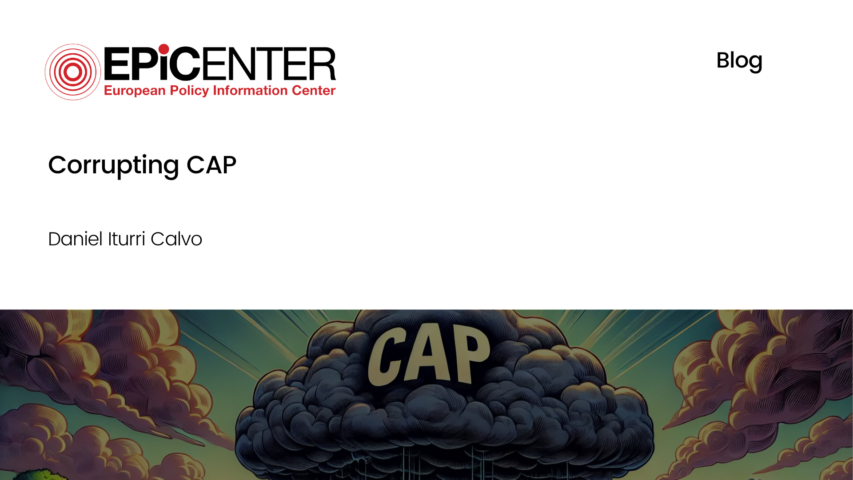Corrupting CAP

Corrupting CAP
Daniel Iturri Calvo // 11 July 2019
A tale of corruption, political scandals, and even murder: the EU’s Common Agricultural Policy (CAP) has turned agriculture in Europe into an environmentally unsustainable, economically infeasible, and administratively unmanageable nightmare. CAP encourages the misuse of resources and fails to achieve its core goal of supporting the work of farmers as it mainly benefits big agricultural corporations. Costing the EU more than €58 billion, CAP has become an outdated policy that fails to benefit farmers and turns a blind eye toward corruption.
When it was launched in 1962, CAP set out to sustain farmers by protecting the market and ensuring a livable wage for farmers. Countries such as France used their political pressure to ensure CAP remained as a pillar of the EU. Thus, it changed very little before the beginning of the new millennium. However, in 2003, CAP underwent one of its most dramatic transitions, with changes such as the decoupling of payments so that specific products couldn’t be targeted through subsidies. Along with decoupling, the EU also switched to the Single Farm Payment scheme, where farmers would now be subsidized based on hectares of land and not production of any specific product. Incentivizing land ownership might have reduced government control over the agricultural market, but it instead made room for manipulation and corruption within the system.
The Single Farm Payment scheme incentivized the destruction of wild natural areas across Europe in order to be turned into “arable fields”, even if those fields remained empty while its owner’s pockets became full. Investors have taken advantage of the new system by buying up rural plots of land, raising the price of land without increasing productivity. And, although reforms were made in 2015 with the implementation of the Basic Payments Scheme, rural land prices have nonetheless increased in the past 20 years. Moreover, reports have shown that 80% of CAP subsidies are given to 20% of farms. The Saudi royal family, Texas oil giants, and even the Queen herself have reportedly received CAP subsidies.
Politicians have also tried to get in on the action. The current massive protests in the Czech Republic, for instance, were triggered by reports of Prime Minister Andrej Babis committing fraud regarding CAP subsidies targeted at small farms but received by his multi-billion-euro company Agrofert. A Slovakian journalist, Jan Kuziak, was murdered after unveiling a story that tied Slovakian politicians to the Italian mafia. Allegedly, they managed to divert millions in CAP subsidies, which sparked national protests and the eventual collapse of the government last year. The Commission also halted CAP subsidies to Bulgaria and Romania over serious allegations of fraud relating to more than €500 million in subsidies.
After reviewing the worst of CAP, what can the new EU leaders do to fix it? A possible solution is the elimination of the policy as a whole, clearing billions of euros for other EU programs and leaving the market to decide the future of European agriculture. Such a decision, however, could not only heavily affect the incomes of the 10.3 million farmers that work in the EU, but also be politically unthinkable for some member states.
A more politically achievable proposal argues that direct payment to farmers should be capped so as to prevent large corporate farms from taking large amounts of subsidies. The Commission was reportedly deliberating on capping direct subsidies to somewhere between 60.000 and 100.000 euros, helping reduce overall CAP expenditure. Moreover, in order to reduce imminent political backlash, leftover CAP subsidies could be given to efforts regarding environmental and climate action. This could mitigate the anger coming from big agro-corporations as they would still be eligible for these subsidies so long as they take part in the much needed environmental and climate transition of the industry. Taking this route could lead to a slow shrinking of CAP overall until it is completely eliminated in a way that doesn’t fully shock the farming industry.
The continuation of CAP as it is will not maintain a sustainable agricultural sector, but rather it will enrich wealthy landowners and promote corruption. Instead, the EU must devise another dramatic restructuring of CAP that ensures a viable environment, promotes the livelihoods of farmers, and reduces the mismanagement of funds.
EPICENTER publications and contributions from our member think tanks are designed to promote the discussion of economic issues and the role of markets in solving economic and social problems. As with all EPICENTER publications, the views expressed here are those of the author and not EPICENTER or its member think tanks (which have no corporate view).



